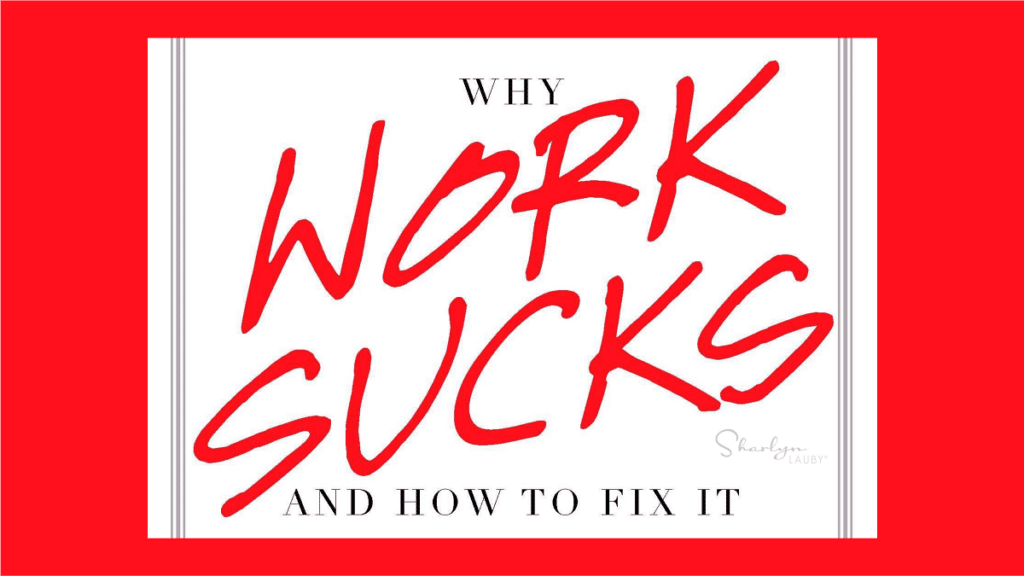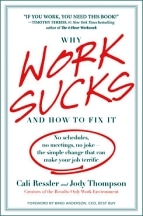Estimated reading time: 8 minutes
Like many people, I’ve been giving a lot of thought to what work will look like in the short- and long-term. While I don’t have a definitive picture of the future, I do believe that work will need to be more centered on results and less on work methods.
The challenge is … this isn’t how a lot of organizations operate. Many focus on the method because if they do, then the results will turn out the way that they want. And this is fine when it’s effective and efficient to do so. The reality is that it’s not always the best way to get results. Especially in remote and hybrid work environments.
A few years ago, I had the opportunity to meet Jody Thompson, founder of CultureRx, a professional services firm specializing in designing and executing change management plans. Thompson is equally well-known as being the co-creator of ROWE, a Results-Only Work Environment. I asked Jody if she would chat with me about ROWE and how organizations can achieve success by focusing on results, not methods. Thankfully, she said yes.
Jody, thanks for being here. In 2005, you introduced the concept of ROWE, a Results-Only Work Environment. For those readers who might need a refresher, can you give us a brief description?
[Thompson] A RESULTS-ONLY WORK ENVIRONMENT (ROWE) is a workplace culture where there is an equal balance between accountability and autonomy for every person. This balance has been proven to be critical to business success and the customer/employee experience.
- If the culture is heavy on autonomy and light on accountability, this typically leads to a chaotic landscape where non-performance is tolerated. There is often a realization in cultures like this that goals and measures are not clear, which prohibits accountability to measurable results.
- If the culture is heavy on accountability and light on autonomy, business operations may be strong but at the expense of the employee experience. The heavy accountability/light autonomy scenario leads to high frustration levels, voluntary turnover, and a lack of engagement in the work.
Traditional flexibility programs – including the hybrid approach – are managed by managers, and work time and location are negotiable and relevant. In a ROWE, accountability to measurable results is the only thing that is relevant and is non-negotiable.
I’m a big fan of giving employees the autonomy to get stuff done. But do you see autonomy the same as working from home (WFH)? Why or why not?
[Thompson] Nothing has really changed in terms of workplace culturesince the pandemic began. Organizations have simply moved ‘location’ from primarily the office to primarily work from home (WFH) with the expectation that once the pandemic passed or got under control, most people would be expected to go back to the office for a certain amount of days – or all days – each week. There’s still meeting fatigue. There’s still the expectation that everyone is ‘available’ during core hours, and if the employee is not available during core ours, they still must ask permission for ‘time off’ to ‘go to a dentist appointment’.
What’s the same is that organizations are still focusing on controlling work location and hours worked. When the big migration back to the office starts happening, employees will be caught in the same flexibility trap – that is, having to ask permission to work from a location other than the office. And each manager will have a different mindset about whether they will ‘allow’ employees this ‘perk or privilege’.
You mentioned returning to the office. A common challenge I hear from business leaders is that “being together is our culture”. How can ROWE allow organizations to maintain their culture and give employees some of the things they’re looking for in terms of where they work?
[Thompson] Let’s start with a prediction: ‘The Great Resignation’ will continue until organizations realize that instead of preserving their existing work culture (which is what leaders say they want), they need to EVOLVE their work culture to keep pace with contemporary society.
When business leaders say ‘being together’ they mean in the same physical location. And that assumes that when we’re communicating in other ways, we’re not ‘together’. That’s outdated thinking. What brings people together is a crystal-clear focus on the measurable results that each person and each team need to achieve and are held accountable for. Start with the work first, and let the people choose the best location to achieve their objectives.
I can see how some organizations might be challenged trying to separate work location and culture. Especially given all the talk about both remote and hybrid work. How can a ROWE help organizations that are trying to figure out their future work plans?
[Thompson] Organizations can benefit by thinking about the realities of work in terms of traditional and contemporary currencies.
Work Reality #1: The traditional currencies are time and location. When work is a place that you go during the hours you owe your employer (1950’s traditional approach), leadership and management use policies and rules to create a standardized, equal, and ‘fair’ employee experience. The belief is that this equality for all environment will lead to motivated, efficient, and effective employees serving a satisfied customer.
An example of this equality for all environment would be the hybrid workplace. In a hybrid workplace, some companies will allow everyone to work 3 days in the office and 2 days at home (or something similar). But does this approach work for every single role in an organization, and for every single week? Are we treating people the same regardless of need (equal), or are we treating people differently depending on need (equality)?
With equality for all environment, managers are still directing when and where people work. And it will never end up truly being fair. Business needs shift and change. People have roles that do not fit nicely into the hybrid box. And what seemed equal is now creating an inherently unequal experience.
Work Reality #2: The contemporary currencies of work are measurable results. When work is something that you do rather than a place you go, leadership and management use clear, objective, measurable results for the customer, and focus on empowering their workforce through an equity for all environment. The belief here is that the company does not own their employees’ time, thus they do not micromanage how that time is used.
An equitable experience – which is critical for today’s workforce – puts everyone on a level playing field of autonomy and accountability. Being held accountable for measurable results for your role is standard. Add to that the autonomy to make the choice to work when and where you work best – every single day. No judgment about who you are or how you choose to live your life.
The key difference between the work realities is equity versus equality. Although both promote fairness, equality achieves this through treating everyone the same regardless of need, while equity achieves this through treating people differently dependent of need. Building a culture of equity is good for people, business, and community. And that’s built on a platform of autonomy and accountability for each person.
I really like the way you’ve identified today’s contemporary work with equity. We both know that not everyone can choose their work location. How does a ROWE work for location-specific jobs?
[Thompson] If I have a location-specific role, I choose to go to that location to get my results. And I am held accountable to those results. I am not distracted by feeling marginalized by not getting to have 3 days in the office, 2 days at home – the ill-fated attempt to make everything equal.
Managers play a key role in making sure the work gets done. In a ROWE, I could see managers needing new skills and training. How could organizations prepare managers for this transition?
[Thompson] A manager becomes a ‘results coach’ in a ROWE. They no longer manage people, or how, when, or where work happens. Results coaches manage the work and ensure deadlines are met, budgets are on track, and customers are satisfied. The transition from a manager to results coach requires a shift in mindset along with adopting new skills and knowledge base.
Last question. For those people reading this and saying to themselves, “This sounds great. But all senior leadership cares about is the bottom-line.” How does a ROWE translate into productivity and profits?
[Thompson] ROWE Certified organizations report that ROWE is a differentiated and powerful talent magnet. Voluntary turnover rates plummet, while involuntary turnover rates rise as leaders and managers hold people accountable to clear, measurable results. Other measures include increases in employee engagement, loyalty, trust, and productivity.
Plus, ROWE accelerates performance management including goal setting and role clarity. Other measures include increased collaboration, clarity of communication, openness to change and strategic alignment. It accelerates innovation, experimentation, problem solving, coaching behaviors and the employee experience.
All of this together creates a healthier bottom line, and a clearer pathway for growth. One of our ROWE Certified clients had top-line growth of 100% in less than 5 years following adoption. ROWE Certified organizations realize up to 30 times their return on investment (ROI) working with CultureRx on implementation, adoption, and support.
A huge thanks to Jody for sharing her knowledge with us. If you want to learn more about ROWE, check out the book that introduced the concept “Why Work Sucks and How to Fix It”.
We’ve been talking about the future of work for a long time. Now might be the right moment to talk about creating a win for all. Everyone wants the same thing – results. It does involve a new mindset, but frankly, we’ve demonstrated that we can change our mindset when we want to. The opportunity exists to make employees happy and deliver results.
The post Organizational Success Should Be Focused on Employee Equity and Results appeared first on hr bartender.





0 Commentaires